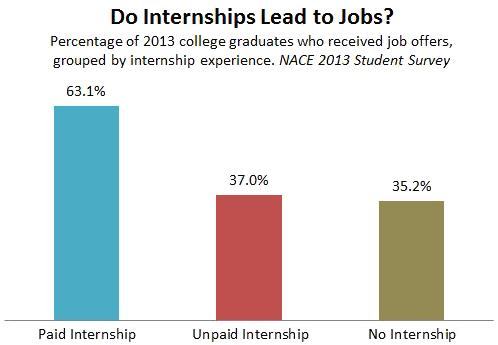Unpaid and Unloved as an Intern

Internships have become a fixture in the world of work. Over the next 12 months countless swarms of eager students will apply for internships in various levels of government, corporate giants, or tiny mom and pop shops. They will get coffee, staple, file, sort, and sell in an attempt to burnish the skills necessary for climbing the career ladder.
Managers and new workers alike get value from an internship. It acts as an extended job interview for employers, while giving employees a chance to receive feedback and prove themselves. Done correctly, an internship is not a chance to fill a seat with cheap labor, but rather an experience filled with learning and growth.
Initially a term restricted to doctors, this form of on-the-job learning quickly became a staple in white-collar training. Much like the blue-collar apprenticeship that spawned it, internships were initially used as a teaching tool. Over time, apprenticeships and internships have progressed down very different paths. Employers compensate employees for undergoing apprenticeships, while 48% of the internships taken by recent graduates were unpaid.
Spending the time and energy necessary to train a new employee and double check the work they produce places a strain on the employer, so governments allowed companies that offered to do this the ability to remove financial compensation. Essentially, the employee is in school, so a pay check isn’t required. Unfortunately, over time, internships have devolved into little more than free labor built around mindless tasks. This in turn has driven the rise in title inflation, resume padding, and is generally having the effect of turning out employees that are as unqualified as those that entered the company. While there is something to be said for the gumption to sit through a mindless internship, or deal with a difficult one, or even make some meaningful changes despite the situation, none of these fixes allow employees that An excellent example of this bias can be found in the relatively modern invention of the internship. Even the learning aspects of the internship are being reduced. Many now consist of menial tasks. This change is beginning to create a wide array of problems for both employees and the firms themselves. For employees, social mobility drops as only those with enough money to support the lost income can afford to take unpaid internships. For companies, generating a sizable group of internal applicants makes it more difficult to hire outside applicants. This has had the effect of lowering the collective IQ inside some larger organizations. Additionally, unpaid internships award inefficiency. Rather than innovating a way around a tedious task, it is given to someone unpaid.
Governments are beginning to crack down using labor laws. In the United States, it is illegal to give an unpaid internship to someone who 1. takes a job away from another employee, or 2. Isn’t learning like they would be if they were in a dedicated classroom setting. Because very few internships meet both these requirements, some larger firms have begun to remove unpaid internships entirely.

Data on internships from The National Association of Colleges and Employers
So what’s the answer? Are unpaid internships worth it? Not usually, the data says. Taking a paid internship results in a more permanent position about 63% of the time. By contrast, unpaid internships equated to a 37% job placement rate. That might not seem to bad on its own, but when you consider that those who didn’t take any internships had a 35% job placement rate in the same amount of time, unpaid internships don’t seem too lucrative—at least not according to the hard figures.
There is a special case that wasn’t mentioned above though. If the company offering you an unpaid internship is one of the top brands you admire, it might be a good idea to get your foot in the door and cultivate relationships with people who work there. When it’s a brand you believe in, the tune changes a little bit. Generally speaking, when you think of working for your ideal company, it’s not only a question of the company producing a product or delivering a service exceptionally well. Most people—especially those who are business minded—also admire companies for their internal processes and the manner in which they’ve made a name for themselves. Indeed, 20% of people would work for a brand they believe in for lower pay when faced with two similar offers. Search for paid internships if you want to be taken seriously, but if it’s a question of working for your dream company, maybe you should consider making special considerations.

